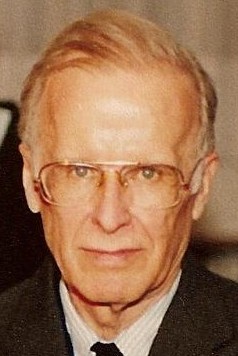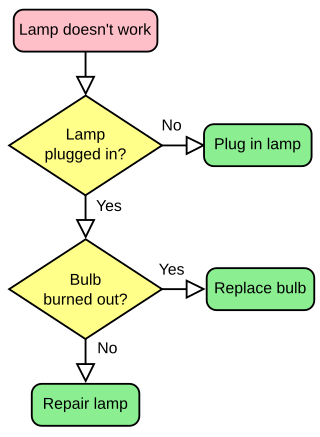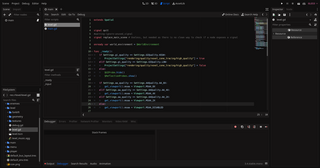In computing, a compiler is a computer program that translates computer code written in one programming language into another language. The name "compiler" is primarily used for programs that translate source code from a high-level programming language to a low-level programming language to create an executable program.
In computer science, functional programming is a programming paradigm where programs are constructed by applying and composing functions. It is a declarative programming paradigm in which function definitions are trees of expressions that map values to other values, rather than a sequence of imperative statements which update the running state of the program.

Fortran is a third generation, compiled, imperative programming language that is especially suited to numeric computation and scientific computing.
Pascal is an imperative and procedural programming language, designed by Niklaus Wirth as a small, efficient language intended to encourage good programming practices using structured programming and data structuring. It is named after French mathematician, philosopher and physicist Blaise Pascal.

John Warner Backus was an American computer scientist. He led the team that invented and implemented FORTRAN, the first widely used high-level programming language, and was the inventor of the Backus–Naur form (BNF), a widely used notation to define syntaxes of formal languages. He later did research into the function-level programming paradigm, presenting his findings in his influential 1977 Turing Award lecture "Can Programming Be Liberated from the von Neumann Style?"
Generic programming is a style of computer programming in which algorithms are written in terms of data types to-be-specified-later that are then instantiated when needed for specific types provided as parameters. This approach, pioneered in the programming language ML in 1973, permits writing common functions or data types that differ only in the set of types on which they operate when used, thus reducing duplicate code.

A flowchart is a type of diagram that represents a workflow or process. A flowchart can also be defined as a diagrammatic representation of an algorithm, a step-by-step approach to solving a task.
The Glasgow Haskell Compiler (GHC) is a native or machine code compiler for the functional programming language Haskell. It provides a cross-platform software environment for writing and testing Haskell code and supports many extensions, libraries, and optimisations that streamline the process of generating and executing code. GHC is the most commonly used Haskell compiler. It is free and open-source software released under a BSD license.

The history of programming languages spans from documentation of early mechanical computers to modern tools for software development. Early programming languages were highly specialized, relying on mathematical notation and similarly obscure syntax. Throughout the 20th century, research in compiler theory led to the creation of high-level programming languages, which use a more accessible syntax to communicate instructions.
In computer science, function-level programming refers to one of the two contrasting programming paradigms identified by John Backus in his work on programs as mathematical objects, the other being value-level programming.
FP is a programming language created by John Backus to support the function-level programming paradigm. It allows building programs from a set of generally useful primitives and avoiding named variables. It was heavily influenced by APL developed by Kenneth E. Iverson in the early 1960s.
Modular programming is a software design technique that emphasizes separating the functionality of a program into independent, interchangeable modules, such that each contains everything necessary to execute only one aspect or "concern" of the desired functionality.
Managed Extensions for C++ or Managed C++ is a deprecated set of language extensions for C++, including grammatical and syntactic extensions, keywords and attributes, to bring the C++ syntax and language to the .NET Framework. These extensions were created by Microsoft to allow C++ code to be targeted to the Common Language Runtime (CLR) in the form of managed code, as well as continue to interoperate with native code.

C# is a general-purpose high-level programming language supporting multiple paradigms. C# encompasses static typing, strong typing, lexically scoped, imperative, declarative, functional, generic, object-oriented (class-based), and component-oriented programming disciplines.
In a programming language, an evaluation strategy is a set of rules for evaluating expressions. The term is often used to refer to the more specific notion of a parameter-passing strategy that defines the kind of value that is passed to the function for each parameter and whether to evaluate the parameters of a function call, and if so in what order. The notion of reduction strategy is distinct, although some authors conflate the two terms and the definition of each term is not widely agreed upon.

Programming language theory (PLT) is a branch of computer science that deals with the design, implementation, analysis, characterization, and classification of formal languages known as programming languages. Programming language theory is closely related to other fields including mathematics, software engineering, and linguistics. There are a number of academic conferences and journals in the area.

In computing, a script is a relatively short and simple set of instructions that typically automate an otherwise manual process. The act of writing a script is called scripting. A scripting language or script language is a programming language that is used for scripting.
Haskell is a general-purpose, statically-typed, purely functional programming language with type inference and lazy evaluation. Designed for teaching, research, and industrial applications, Haskell has pioneered several programming language features such as type classes, which enable type-safe operator overloading, and monadic input/output (IO). It is named after logician Haskell Curry. Haskell's main implementation is the Glasgow Haskell Compiler (GHC).

Object-oriented programming (OOP) is a programming paradigm based on the concept of objects, which can contain data and code: data in the form of fields, and code in the form of procedures. In OOP, computer programs are designed by making them out of objects that interact with one another.
Hack is a programming language for the HipHop Virtual Machine (HHVM), created by Meta as a dialect of PHP. The language implementation is free and open-source software, licensed under an MIT License.







